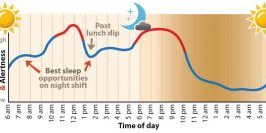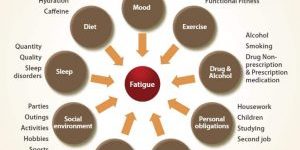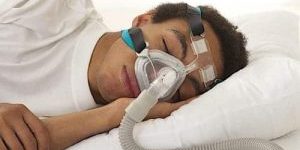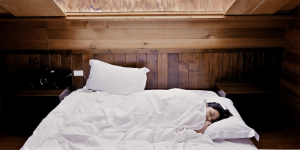How does caffeine affect sleep
When should I sleep?
Our levels of alertness and attention are influenced by our circadian rhythms, as shown in the figure below. Circadian rhythms allow us to feel more alert during the day and less alert during the evening. This is the primary reason it is difficult to stay awake at night and why we may struggle to sleep……
Top 10 sleep tips
Poor sleep habits have often been reinforced over many years. The good news is that there are some common things you can do that will improve your sleep hygiene. Different things may work for different people. The main thing is to try not to worry about not getting enough sleep. The odd poor night’s sleep……
Sleep debt
Sleep debt is the cumulative effect of not getting enough sleep. Two kinds of sleep debt have been proposed: 1) partial sleep deprivation; or 2) total sleep deprivation. Partial sleep deprivation occurs when a person gets inadequate sleep for many days or weeks. Total sleep deprivation occurs when a person is kept awake for days……
Mood & physical activity
Think about the last time you took a brisk walk. How did you feel afterwards? I bet you felt good! You don’t have to wait for the good feeling physical activity brings. It starts right away – and then gets better. Studies have shown that regular physical activity reduces stress-related symptoms and decreases the risk……
Hydration
Your body needs adequate fluid and electrolytes in order to have any chance of feeling energised. If these needs are not met, then physical and mental fatigue will increase, as will the potential for incidents, accidents and health problems. Hot weather, particularly when or working or being physically active, in the heat puts greater demands……
What can you do to manage fatigue?
Taking action against fatigue happens in two forms: 1) the action you take when you experience fatigue; and 2) the action you take to prevent fatigue and therefore become more fatigue resistant. Figure 1 below summarises the causes of fatigue and identifies the areas that need to be focused on to build fatigue resistance. Although……
Exercise and sleep
Regular exercise can considerably improve the quality and quantity of sleep, as well as, having other benefits to general health and wellbeing. Exercise improves sleep by improving the release and uptake of neurotransmitters in the brain. This provides a positive environment for the brain to function allowing sleep to occur more naturally.There are some considerations……
Sleep Disorders
It is estimated that 6% of the population suffer from sleep disorders. Sleep disorders may make some health conditions worse such as, heartburn, depression, asthma and heart disease. Sleep disorders are diagnosed by a GP or sleep specialist. If you are experiencing poor sleep and have some of the following symptoms, you may want to……
Is it possible to have too much sleep each night?
It is still largely unknown how many exact hours of sleep per day are needed in adults, according to their age, their environmental and socio-cultural characteristics. It is generally cited that 7-8 hours of sleep is sufficient for adults and there is ongoing research to identify what is the optimal sleep need. However, there is……
Energy requirements & fatigue
Eating too much food will provide more energy than we need for metabolic and activity needs, leaving the extra energy stores as body fat (weight). The greater your body weight, the more chance you are of experiencing fatigue. The graph below shows that, as body weight increases above 86kg for an average height man, and……










